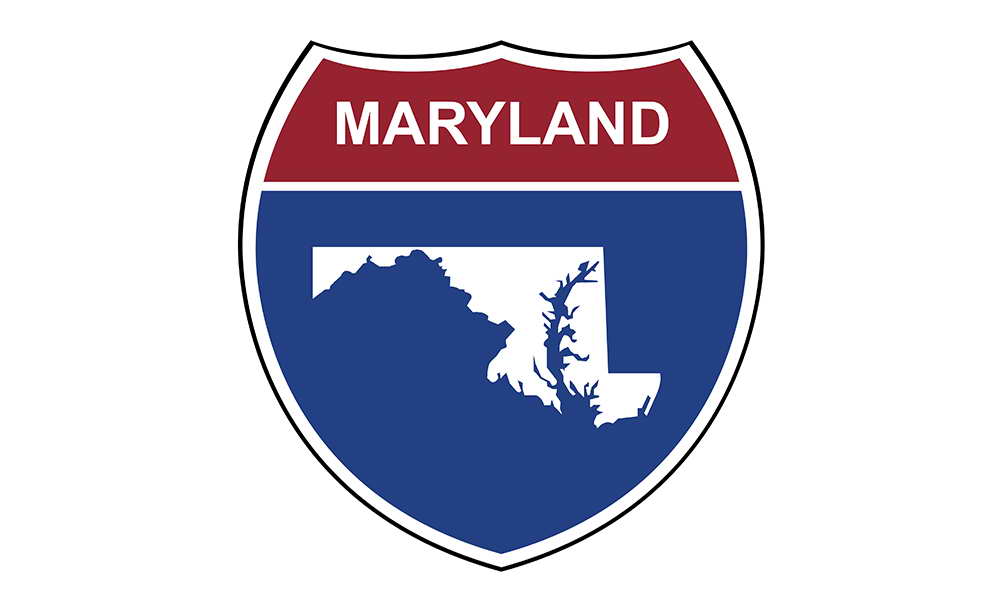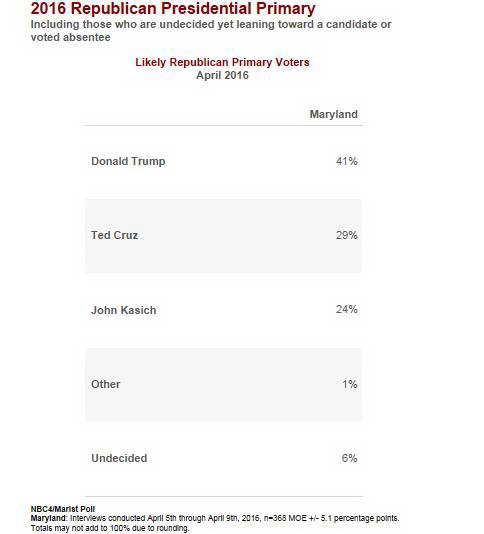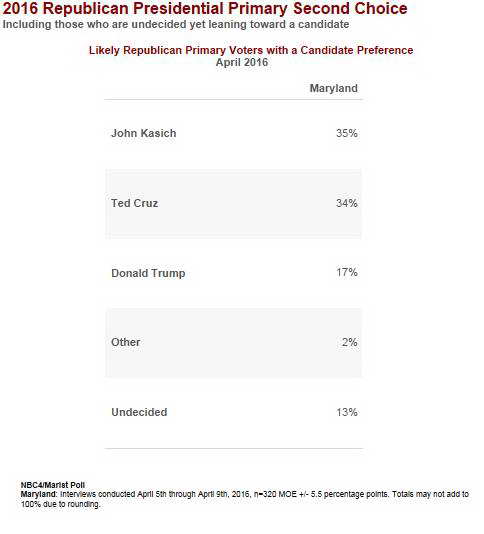April 13, 2016
4/13: In Maryland, Trump & Clinton with Commanding Leads
NBC 4/Marist Poll
In Maryland, businessman Donald Trump has a 12 point lead over Texas Senator Ted Cruz among the likely Republican primary electorate. On the Democratic side, former Secretary of State Hillary Clinton has a wide 22 point lead over Vermont Senator Bernie Sanders among likely Democratic primary voters statewide.
Looking at the Republican contest, Trump receives 41% to 29% for Cruz and 24% for Ohio Governor John Kasich among likely Republican primary voters.
“If the front-runners maintain their leads, Trump and Clinton remain on the path to securing their respective party’s nomination,” says Dr. Lee M. Miringoff, Director of The Marist College Institute for Public Opinion. “With two weeks to go to the Maryland primary, their rivals need to find a way to close the gap.”
Trump does best among likely Republican primary voters in Maryland who do not practice a religion, Tea Party supporters, earn less than $50,000 annually, or do not have a college degree. Trump and Cruz tie among white evangelical Christians. They are also competitive among those who practice a religion and women. Also noteworthy, Kasich leads by double digits among likely Republican primary voters who describe themselves as moderate.
58% of likely Republican primary voters with a candidate preference strongly support their choice of candidate. When compared with Cruz’s supporters, 51%, and Kasich’s backers, 44%, a larger proportion of Trump’s supporters, 71%, report they are firmly committed to their candidate selection.
Among likely Republican primary voters with a candidate preference, Kasich, 35%, and Cruz, 34%, are the most mentioned second choice. Trump receives 17%.
On the Democratic side, Clinton, 58%, outpaces Sanders, 36%, by 22 points among likely Democratic primary voters. Clinton leads Sanders among most demographic groups, but she does especially well among likely Democratic primary voters who are women and 45 years of age or older or African Americans. Sanders has a double-digit lead over Clinton among those who are under 45 years old.
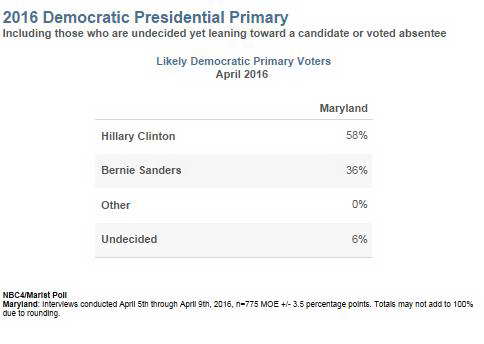
69% of likely Democratic primary voters with a candidate preference are firmly committed to their choice of candidate. 72% of Clinton’s supporters, compared with 65% of Sanders’ backers, report they strongly support their candidate of choice.
Turning to this fall’s general election, Clinton and Sanders both have large leads over their potential Republican rivals. They have their greatest advantage when matched against Trump.
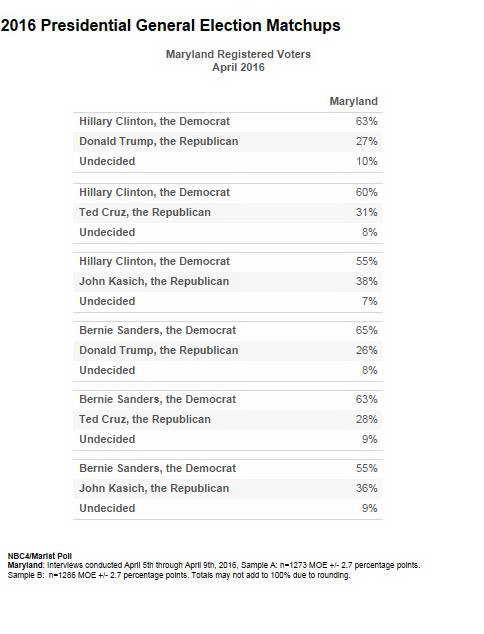
In Maryland’s Republican primary for U.S. Senate, a majority of likely voters, 57%, are undecided. Kathy Szeliga, 20%, is ahead of Richard Douglas, 13%, and Chrys Kefalas, 9%, among likely Republican primary voters. Only 28% of likely Republican primary voters with a candidate preference strongly support their choice of candidate. 36% somewhat support their selection, and 35% say they might vote differently.
In the Democratic contest for U.S. Senate, Chris Van Hollen, 44%, and Donna Edwards, 38%, are competitive among likely Democratic primary voters. 18% are undecided. 53% of likely Democratic primary voters with a candidate preference say they strongly support their choice of candidate. Similar proportions of Edwards’ supporters, 55%, and Van Hollen’s backers, 53%, say they strongly support their candidate.
On the issues, more than two-thirds of Maryland residents, 67%, including 68% of registered voters, agree with the change in state law which decriminalizes the possession of small amounts of marijuana. 75% of Democrats, 70% of independents, and even 53% of Republicans agree with the change in the law.
There is less consensus when it comes to legalizing betting on fantasy sports websites such as Fan Duel and Draft Kings. 40% of residents, including the same proportion of registered voters, support such a proposal while 43% oppose it. 17% are undecided. While pluralities of Republicans, 48%, and Democrats, 44%, are against legalizing such behavior, a plurality of independents, 46%, support it.
A majority of Maryland adults, 59%, including the same proportion of registered voters, think the laws governing the sale of guns should be stricter. 14% say they should be less strict, and 24% report they should be kept as they are. While most Democrats, 82%, support strengthening the laws governing the sale of firearms, a plurality of Maryland’s GOP, just 36%, believes these laws should be kept as they are. A plurality of independents, 46%, think the laws should be stricter.
Both Maryland Governor Larry Hogan and President Barack Obama are highly regarded among residents statewide. More than two-thirds of Maryland adults, 67%, approve of Governor Hogan’s job performance. 15% disapprove. Looking at the job performance of President Obama, 62% of residents statewide, including 88% of likely Democratic primary voters, approve of how the president is doing his job. 31% disapprove.
Complete April 12, 2016 NBC4/Marist Poll Release of Maryland
Complete April 12, 2016 NBC4/Marist Poll Tables of Maryland (Adults & Registered Voters)
Complete April 12, 2016 NBC4/Marist Poll Tables of Maryland (Likely Republican Primary Voters)
Complete April 12, 2016 NBC4/Marist Poll Tables of Maryland (Likely Democratic Primary Voters)
Marist Poll Methodology for Maryland
Nature of the Sample for Maryland

